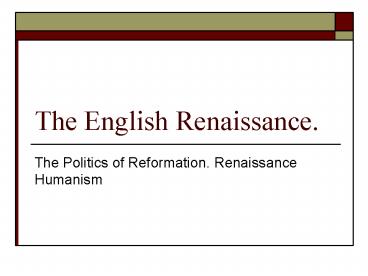The English Renaissance' - PowerPoint PPT Presentation
1 / 13
Title:
The English Renaissance'
Description:
... roots in the 15th century Sir Thomas More, Sir Thomas Elyot, and Roger Ascham ... 1490 1546), and Roger Ascham (1515 68), English humanism bore fruit in major ... – PowerPoint PPT presentation
Number of Views:99
Avg rating:3.0/5.0
Title: The English Renaissance'
1
The English Renaissance.
- The Politics of Reformation. Renaissance Humanism
2
The English Renaissance ontological issues
- This notion is a modern invention, popularized by
Jacob Burckhardt in the 19th century - The "English Renaissance" has no real tie with
the artistic achievements of Italian artists - We will consider 1485 the "start" of the
"Renaissance due to 2 key events - Accession of Henry VII the beginning of the
Tudor dynasty - Caxton's publication of Sir Thomas Malory's Morte
Darthure English literature enters the print era
3
- Etimologically, the term Renaissance comes from
Fr. Rebirth - The Romantics considered the "middle ages" to be
the interval between Classical Antiquity ancient
Greece and Rome) and the "rebirth" of that lost
glory. - In fact, medieval writers shared the Renaissance
humanist's preoccupation with establishing a
connection to the glory of Rome - This anticipates the Renaissance admiration for
the literature of classical antiquity
4
- There was undeniably an artistic flowering in
England under the Tudor dynasty, culminating in
Shakespeare and his contemporaries - Many historians and cultural historians now
prefer to use the term "early modern" for this
period - Historians have also begun to consider the term
"Renaissance" as unnecessarily loaded
5
The politics of Reformation
- It was imperative that the Bible be available in
vernacular languages - These translations be perceived as a threat to
the authority of the Church. - Late 1520s the Catholic authorities of England
tried to buy up and burn all copies of William
Tyndale's English translation of the Bible - They were attempting to stop the spread of what
they viewed as a heresies spreading out from
Luther's Germany.
6
- The Protestant Reformation a movement opposed to
crucial aspects of both the belief system and the
institutional structure of Roman Catholicism. - Many of the key tenets of the Reformation had
been anticipated in England by the teachings of
John Wycliffe in the14th century - In 1517, Martin Luther, a monk and professor of
theology challenged the Papal authority and
attacked several key doctrines of the Catholic
Church.
7
- According to Luther, the Church had become
hopelessly corrupt, manipulating popular
superstitions to enrich itself and amass worldly
power. - Luther began by vehemently attacking the sale of
indulgences - These had no foundation in the Bible, which in
Luther's view was the only legitimate source of
religious truth - This challenge spread and gathered force,
especially in Northern Europe
8
- The Reformation had a direct and powerful impact
on those realms where it gained control - Protestant congregations continued, for the most
part, to celebrate the most sacred Christian
ritual the Last Supper - They now prayed not in the old liturgical Latin
but in the vernacular - The Reformation was at first vigorously resisted
in England
9
- The situation changed decisively when Henry VIII
decided to divorce from Catherine of Aragon, in
order to marry Anne Boleyn - In 1531 Henry charged the entire clergy of
England and the king became "supreme head of the
English Church and clergy" - The king was promptly excommunicated by Pope
Clement VII. - Royal defiance of the authority of Rome was a key
element in the Reformation but did not by itself
constitute the establishment of Protestantism in
England
10
Protestantism dynamics
- It arose from a mid-15th century technological
innovation the printing press. - Early Protestants grasped that with a few
clandestine presses could defy Catholic
authorities - This tenacity arose from the passionate, often
suicidal heroism of men and women who embraced
martyrdom. - By the end of the 16th century, it was the
Catholics turn to use the clandestine press to
propagate their beliefs
11
Humanism
- Term freely applied to a variety of beliefs and
philosophies that place central emphasis on the
human realm - Most frequently, the term is used with reference
to a system of education and mode of inquiry
developed in N. Italy during 14th century. - A broadly and profoundly influential program one
of the chief reasons why the Renaissance is
viewed as a distinct historical period. - First employed (as humanismus) by 19th-century
German scholars to designate the Renaissance
emphasis on classical studies in education.
12
- The term derives from studia humanitatis course
of classical studies (grammar, poetry, rhetoric,
history, and moral philosophy) - Studia humanitatis were held to be the equivalent
of the Greek paideia. - Humanitas, an educational and political ideal
that was the intellectual basis of the entire
Renaissance movement - Renaissance humanism defined itself in its
straining toward this ideal.
13
English Renaissance Humanism (intro)
- English humanism flourished in two stages
- a basically academic movement that had its roots
in the 15th century Sir Thomas More, Sir Thomas
Elyot, and Roger Ascham - a poetic revolution led by Sir Philip Sidney and
William Shakespeare. - English humanism as a distinct phenomenon did not
emerge until late in the 15th century - The Oxford group were philological and
institutional rather than philosophical or
literary - In Sir Thomas More (14781535), Sir Thomas Elyot
(c. 14901546), and Roger Ascham (151568),
English humanism bore fruit in major literary
achievement































